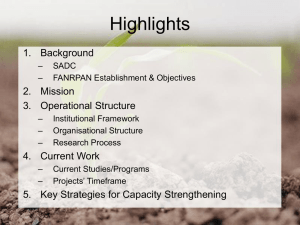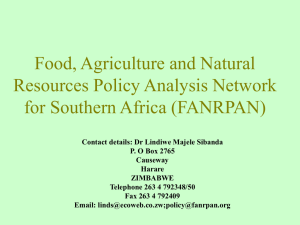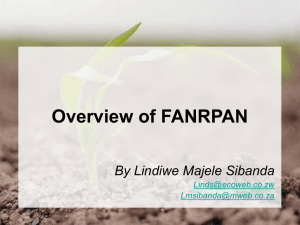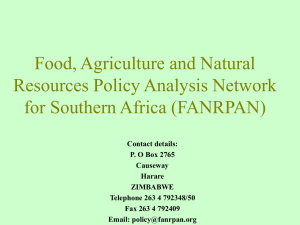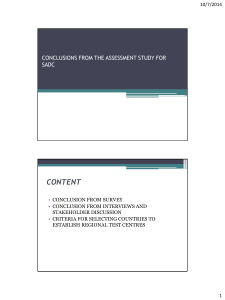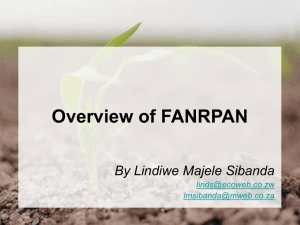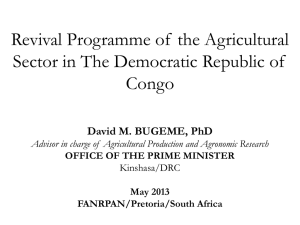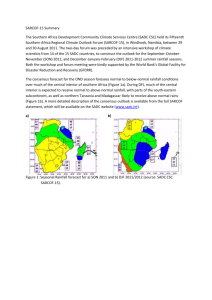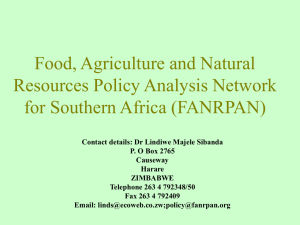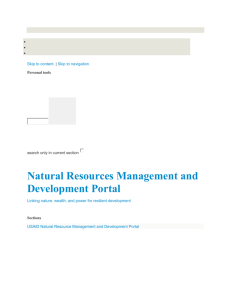fanrpan_overview.ppt
advertisement
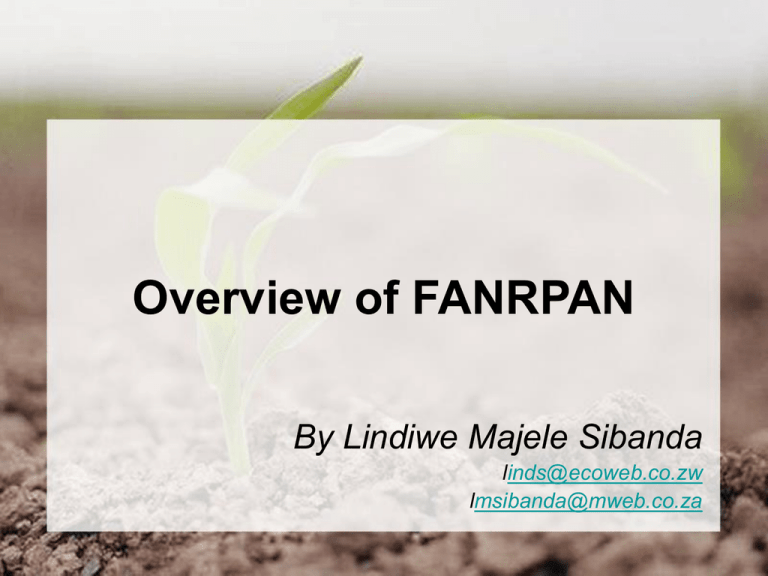
Overview of FANRPAN By Lindiwe Majele Sibanda linds@ecoweb.co.zw lmsibanda@mweb.co.za Highlights 1. Background – – SADC Background Establishment & Objectives 2. Mission 3. Operational Structure – – – Institutional Framework Organisational Structure Research Process 4. Current Work – – Current Studies/Programs Projects’ Timeframe 5. The Proposal – – Rationale and Objectives Outputs FANRPAN Background SADC Background • SADC region (200 million people) face food insecurity challenges. • Agriculture is the prime driver of economic development across SADC. • Agricultural investments by governments have remained low. SADC Background (ctnd) • Agricultural yields for crops and livestock have been level or declining. • Food aid and imports have almost doubled in the last 10 years. • HIV/AIDS pandemic, natural disasters (droughts, floods) and civil conflicts have compromised region’s efforts to ensure food security. Establishment & Objectives • Against this background, SADC Ministers of Agriculture recommended the formation of FANRPAN in 1994 to: – Promote appropriate agricultural policies in order to reduce poverty – Increase food security and promote sustainable agricultural development Establishment & Objectives • FANRPAN was formed to: – Promote appropriate agricultural policies in order to reduce poverty – Increase food security and promote sustainable agricultural development – Focus on promoting regional trade and exchange of information across member states – Provide a conducive policy and legal framework, including functional input supply and markets for surplus products Mission FANRPAN Mission • To coordinate, influence and facilitate policy research, analysis and dialogue at the national, regional and global levels in order to develop the food, agriculture and natural resources sector. • The Mission is achieved through networking, capacity building and information generation for the benefit of the SADC region Operational Structure Institutional Framework • An autonomous stakeholder-driven policy research analysis and implementation network • Regional secretariat based in Harare, Zimbabwe • Strategically positioned to deal with policy aspects of food security • Represented in 11 of the 13 SADC countries through an inter-sectoral platform designated as a country node Institutional Framework FANRPAN Structure FANRPAN Research Process Country Issues Debated at Country Level Regional Synthesis Cross-cutting Issues Coordination of Regional Research Dissemination of Outputs At Country & Regional Levels Advocacy Through SADC Ministers Current Work Current Studies/Programs Impact of HIV & AIDS on Agriculture & Food Security • This is part of a five-year EU funded project • The 2 year study is aimed at determining the impact of HIV & AIDS on food security and recommend mitigation and coping strategies for adoption by Ministries of Agriculture in the region Rural Livelihoods Project in Southern Africa • FANRPAN implemented the policy module of the International Institute of Agriculture’s “Improving Rural Livelihoods In Southern Africa Project” • The objective of the study was to come up with recommendations on designing policies for unlocking constraints to rural economy diversification • The project ended in October 2004 Strengthening Capacity of Farmer Based Organisations • The objective was to strengthen the capacity of farmer-based organisations in policy analysis and advocacy in order to enhance their role in policy priority setting and communication for decision making in rural development • FANRPAN collaborated with the Southern African Confederation of Agricultural Unions (SACAU) Biodiversity Policy Issues For Food Security • FANRPAN commissioned policy papers on agricultural biotechnology policy issues from 11 SADC countries • A regional synthesis paper was produced • This study is part of a wider debate on the role of biotechnology in agriculture, the subject of genetically modified food and biosafety Maize Marketing Study • This is a 2 year study being undertaken in collaboration with Michigan State University • The objective is for policy makers to implement more effective food policies leading to improved food policies leading to improved household security Contract Farming • This is a study to come up with action plans that can be used to expand the use of contract farming as a mechanism for commercialisation of smallholder agriculture in the SADC region • The study is being undertaken in phases over a three year period by teams from country nodes in S. Africa, Malawi & Zambia CTA Communication & Networking • The Centre for Technical Cooperation (CTA) supports FANRPAN’s communication and networking activities • The support is for publications, policy dialogue and networking PROJECTS TIMEFRAME The Proposal Rationale & Objectives • To strengthen the capacity of the regional secretariat • To enable FANRPAN to undertake priority regional policy research studies and advocacy on identified issues • To strengthen the capacity of country level policy nodes to conduct policy dialogue session Rationale & Objectives • To strengthen linkages with SADC, NEPAD and AU Outputs • Capacity of the Regional Secretariat Strengthened • Capacity of the Country Level Nodes Strengthened • Priority Regional Policy Studies and Advocacy on Identified Outputs (Ctnd) • Issues that are Common to All Countries Conducted Through a Systematic Regional Framework • Priority National Policy Studies and Advocacy on Identified • Issues Conducted Systematically Through the Country Nodes
